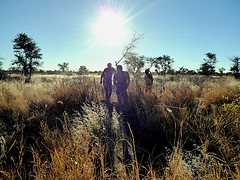
[Please see the updates under this post. Until a likely article on horticulture and indigenous land management, they will serve as a first pass at the subject.]
[Revised 4/30/16]
Time for an update listing some simple, related points which underlie my thinking today.
A fuller version of these and other ideas will appear in a new article I've written. (Here's a link.)
So here's the gist...
Civilization is inherently destructive and unsustainable. A key reason for this is that civilization is founded on agriculture. Agriculture circumvents the natural processes which regulated human population numbers prior to its inception. It is the basic ecological factor which has caused our numbers to overshoot carrying capacity so enormously. Along the way, agriculture destroys topsoil and ecosystems, tearing down the web of life, our global life support system. Agriculture is therefore unsustainable.
Civilization will therefore come to an end. Because the human population is deeply into overshoot, we know that ending will involve a tremendous decline in our numbers. Converging issues such as oil depletion, climate change, topsoil and groundwater depletion, and the human-caused sixth mass extinction event in Earth's history suggest this may occur not many centuries from now, but sooner. How much sooner, no one can say. Though this signals the potential for tough times ahead, it also means an end to what's killing the earth.
Immediate-return hunting and gathering (see below) is arguably the only human way of living proven ecologically sustainable. It thus makes great sense to study it to learn all we can.
In light of the progressive destruction of Earth's life support systems, we see the reason for calls for a resistance movement from writers such as Zerzan and Jensen. Every day civilization remains intact brings more destruction of the web of life. Yet the potential for unintended consequences of such resistance actions presents a thorny dilemma to would-be advocates.
An easier yet tremendously valuable option is to do what we can through established conservation measures to protect as much habitat and biodiversity as possible, helping to preserve those things for the future. One of the most important and ambitious conservation projects today involves "rewilding" by restoring, protecing, and connecting wildlands corridors containing large predators on a continental scale. That and other projects are represented in "organizations" page on this site.
If you're interested in this topic, see the "core ecological issues" page for relevant links.
_______
Image source: David Barrie's photostream, flickr.com, creative commons license
When investigating hunter-gatherers, it's worth keeping a couple of things in mind. First, make sure you are looking at hunter-gatherers. I often see people, even prominent writers, attribute characteristics to hunter-gatherers only to find they are talking about some society which is actually agrarian or pastoral.
Second, it is crucial to understand the differences between "immediate-return" and "delayed-return" hunter-gatherers. As far as we know, the former term (roughly synonymous with "simple" hunter-gatherers) describes our ancestors' subsistence for the great bulk of human history. (See, e.g., Berman's Wandering God, 2000, p. 54; Kelly's The Foraging Spectrum, 2007, p. 304) Moreover, it's clear any debate on the matter becomes increasingly unreasonable as we work our way back through human existence. The first delayed-return societies may have begun to emerge during the Upper Paleolithic. Among these were also the first tribal societies, immediate-return societies having been composed of bands, not tribes.
Anthropologist Ernest S. Burch, Jr. wrote:
"In my judgment, the most definitive division of small-scale societies identified so far is not between foraging and agrarian, but between immediate-return and delayed-return societies... or nonstoring and storing societies... As Testart... put it,
Agriculturalists and storing hunter-gatherers together are neatly in opposition to nonstoring hunter-gatherers. ...
Immediate-return or 'generalized' hunter-gatherer societies are so unlike all others that, as Birdsell... once noted, it is difficult even for anthropologists who have not personally experienced one to conceive how they can exist; it is almost impossible for nonanthropologists to do so."
I've observed that few nonanthropologists seem truly to appreciate this distinction. I belive even some anthropologists haven't thought much about it. Yet it makes all the difference. (For more see the "core ecological issues" page.)
Update on "traditional land management"
I've completed the first of two, perhaps three papers on "traditional land management" (AKA protoagriculture, low level food production, indigenous land management, etc.). Much of the material for the next two papers is completed. This has been a long process, immersing myself in the anthropological and ecological literatures, and relearning much about the scholarly writing process. I expect the first paper to be published fairly soon by a student-run radical ecology journal. I will post a link to it in the "Articles" section when it's available.
These papers should provide useful reading for anyone wishing to go a large step beyond what I wrote above and in my article on agriculture.
